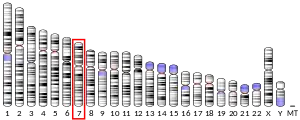MicroRNA 93
MicroRNA 93 is a functional RNA and a microRNA that in humans is encoded by the MIR93 gene. [3]
| MIR93 | |||||||||||||||||||||||||||||||||||||||||||||||||||
|---|---|---|---|---|---|---|---|---|---|---|---|---|---|---|---|---|---|---|---|---|---|---|---|---|---|---|---|---|---|---|---|---|---|---|---|---|---|---|---|---|---|---|---|---|---|---|---|---|---|---|---|
| Identifiers | |||||||||||||||||||||||||||||||||||||||||||||||||||
| Aliases | MIR93, MIRN9, MIRN93, hsa-mir-93, miR-93, microRNA 93 | ||||||||||||||||||||||||||||||||||||||||||||||||||
| External IDs | OMIM: 612984 GeneCards: MIR93 | ||||||||||||||||||||||||||||||||||||||||||||||||||
| |||||||||||||||||||||||||||||||||||||||||||||||||||
| |||||||||||||||||||||||||||||||||||||||||||||||||||
| |||||||||||||||||||||||||||||||||||||||||||||||||||
| Wikidata | |||||||||||||||||||||||||||||||||||||||||||||||||||
| |||||||||||||||||||||||||||||||||||||||||||||||||||
Function
The primary transcript is cleaved by the Drosha ribonuclease III enzyme to produce an approximately 70 nucleotide long stem-loop precursor miRNA (pre-miRNA), which is further cleaved by the cytoplasmic Dicer ribonuclease to generate the mature miRNA and antisense miRNA star (miRNA*) products. The mature miRNA is incorporated into a RNA-induced silencing complex (RISC), which recognizes target messenger RNAs (mRNA) through imperfect base pairing with the miRNA and most commonly results in translational inhibition or destabilization of the target mRNA. The RefSeq represents the predicted microRNA stem-loop.[4]
References
- GRCh38: Ensembl release 89: ENSG00000207757 - Ensembl, May 2017
- "Human PubMed Reference:". National Center for Biotechnology Information, U.S. National Library of Medicine.
- "Entrez Gene: MicroRNA 93". Retrieved 2018-10-24.
- RefSeq, Sep 2009
Further reading
- Petrocca F, Visone R, Onelli MR, Shah MH, Nicoloso MS, de Martino I, Iliopoulos D, Pilozzi E, Liu CG, Negrini M, Cavazzini L, Volinia S, Alder H, Ruco LP, Baldassarre G, Croce CM, Vecchione A (March 2008). "E2F1-regulated microRNAs impair TGFbeta-dependent cell-cycle arrest and apoptosis in gastric cancer". Cancer Cell. 13 (3): 272–86. doi:10.1016/j.ccr.2008.02.013. PMID 18328430.
- Yeung ML, Yasunaga J, Bennasser Y, Dusetti N, Harris D, Ahmad N, Matsuoka M, Jeang KT (November 2008). "Roles for microRNAs, miR-93 and miR-130b, and tumor protein 53-induced nuclear protein 1 tumor suppressor in cell growth dysregulation by human T-cell lymphotrophic virus 1". Cancer Res. 68 (21): 8976–85. doi:10.1158/0008-5472.CAN-08-0769. PMC 2596768. PMID 18974142.
- Li Y, Tan W, Neo TW, Aung MO, Wasser S, Lim SG, Tan TM (July 2009). "Role of the miR-106b-25 microRNA cluster in hepatocellular carcinoma". Cancer Sci. 100 (7): 1234–42. doi:10.1111/j.1349-7006.2009.01164.x. PMID 19486339. S2CID 39583369.
- Du L, Schageman JJ, Subauste MC, Saber B, Hammond SM, Prudkin L, Wistuba II, Ji L, Roth JA, Minna JD, Pertsemlidis A (August 2009). "miR-93, miR-98, and miR-197 regulate expression of tumor suppressor gene FUS1". Mol. Cancer Res. 7 (8): 1234–43. doi:10.1158/1541-7786.MCR-08-0507. PMC 2741087. PMID 19671678.
- Shen J, DiCioccio R, Odunsi K, Lele SB, Zhao H (February 2010). "Novel genetic variants in miR-191 gene and familial ovarian cancer". BMC Cancer. 10: 47. doi:10.1186/1471-2407-10-47. PMC 2831822. PMID 20167074.
- Roccaro AM, Sacco A, Jia X, Azab AK, Maiso P, Ngo HT, Azab F, Runnels J, Quang P, Ghobrial IM (September 2010). "microRNA-dependent modulation of histone acetylation in Waldenstrom macroglobulinemia". Blood. 116 (9): 1506–14. doi:10.1182/blood-2010-01-265686. PMC 2938840. PMID 20519629.
- Hu Z, Shu Y, Chen Y, Chen J, Dong J, Liu Y, Pan S, Xu L, Xu J, Wang Y, Dai J, Ma H, Jin G, Shen H (March 2011). "Genetic polymorphisms in the precursor MicroRNA flanking region and non-small cell lung cancer survival". Am. J. Respir. Crit. Care Med. 183 (5): 641–8. doi:10.1164/rccm.201005-0717OC. PMID 20889907.
- Fang L, Deng Z, Shatseva T, Yang J, Peng C, Du WW, Yee AJ, Ang LC, He C, Shan SW, Yang BB (February 2011). "MicroRNA miR-93 promotes tumor growth and angiogenesis by targeting integrin-β8". Oncogene. 30 (7): 806–21. doi:10.1038/onc.2010.465. PMID 20956944.
- Choi OR, Lim IK (April 2011). "Loss of p21(Sdi1) expression in senescent cells after DNA damage accompanied with increase of miR-93 expression and reduced p53 interaction with p21(Sdi1) gene promoter". Biochem. Biophys. Res. Commun. 407 (2): 406–11. doi:10.1016/j.bbrc.2011.03.038. PMID 21402054.
This article incorporates text from the United States National Library of Medicine, which is in the public domain.

